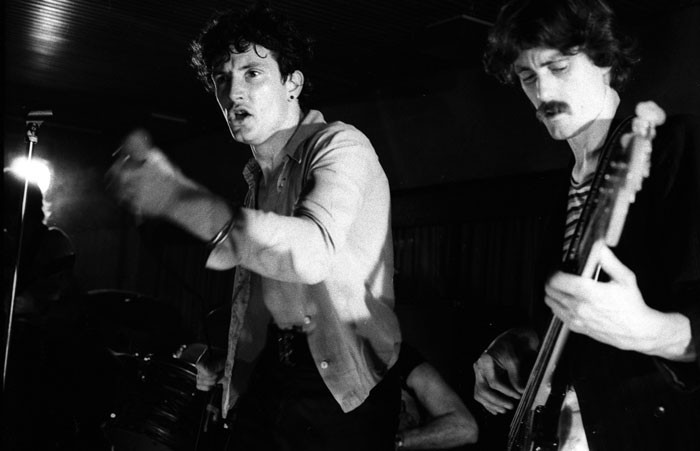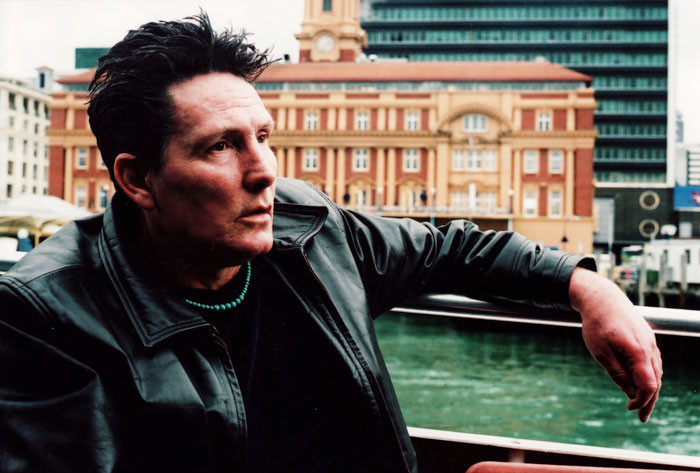Nursing his sore muscles from the weekend’s cricket match, Graham Brazier packs his bags for a few days’ sunshine and scallops in Whitianga.
The cricket was a music industry match, with Brazier’s team, put together by his manager Mike Corless, winning – though no one knows which rock band that high-scoring Pakistani batsman came from. Brazier managed seven runs before being felled by the “formidable” bowling of Trevor Reekie.
Brazier’s cottage, behind his mother’s house in a quiet Auckland cul-de-sac, is full of books. Mrs Brazier used to run an excellent second-hand bookshop, and her son caught the collector’s bug. His field is “middle American writing – Charles Bukowski, William Burroughs, Lawrence Ferlinghetti.”

On the bookshelves by the demo tapes and scrapbooks one can spot a Josh White songbook and sheet music to Exile On Main Street. In a glass case, Bing Crosby’s Call Me Lucky and Errol Flynn’s My Wicked Wicked Ways sit alongside Bukowski and Burroughs first editions. Current reading? Wired: the Fast Times and Short Life of John Belushi, and Glory Days, the new Springsteen biography.
“I’ve always said, and I think Harry once quoted me, ‘If you want to paint, look and observe. If you want to write, read. If you want to play, listen.’ That’s always been my approach,” says Brazier.
The jack-the-lad image has overshadowed the literacy that has always been present in Brazier’s best work.
The jack-the-lad image has overshadowed the literacy that has always been present in Brazier’s best work. Springsteen and Paul Kelly he currently admires, “two geniuses who can pull amazing melodies out of three simple chords.” But hiding way back there is Rod Stewart, the blues-mad street boy who made good and then bad. The nervy adolescent who “combed his hair a thousand ways” in ‘Every Picture Tells a Story’ found a blue lady and rode a Vincent Black Shadow.
Yes, Brazier identifies with that likeable rogue and romantic. “One big similar thing between Rod Stewart and I was we both had to make a decision whether it was gonna be sport or music,” he says. “When you come from a working-class background, you have two real ways of making a career: sport or music. He was a very good soccer player, had a chance to play for Celtic Rangers, but turned it down because of his band. I was offered to play premier rugby league – this was in my rubbish-truck days – but I gave it away to play music.”
Like Stewart, Brazier was weaned on folk. His elder brother used to come home with his merchant-seaman mates and fill the house with salty-worded sea shanties. ‘The Boat Song’, which has been re-arranged for the new album Brazier, was passed down from his father.
When the time came to play his own music, it was country blues. “I had a very large collection of about 300 albums, which unfortunately was lost in a house fire. Everyone who has learnt to play slide guitar has learnt from Robert Johnson: Cream, Led Zeppelin, Dylan, the Stones, all have done Robert Johnson songs, though Dylan only ever pulled lines, like Led Zeppelin.”
To prove it, Brazier pulls out an old acoustic, the orange-stained Epiphone from the Inside Out cover, and with a morning-after voice sings ‘It Takes a Lot to Laugh, It Takes a Train to Cry’: “I ride that mail train babe, that don’t buy no thrill. I’ve been up all night babe, leaning on the window sill.” He carefully inserts slide licks, taking the 1965 Dylan song back to the 1930s Mississippi Delta, by way of Elvis’s ‘Milkcow Blues Boogie’.
He’s been thinking about doing an acoustic album. “I could actually do quite a good one, mostly traditional stuff, but I could write a few songs. It’d be interesting but I couldn’t imagine it would sell greatly. But it’d give me a better audience to play to acoustically.” Mandolin, banjos, some mates to play on it … “Yeah, I’d love it.”

“The Pogues are largely responsible for me wanting to carry on. I thought, Shit, it’s getting a bit too much for me, all these synthesisers and DMXs that they all use – is it ever gonna return to the stage where they use real instruments? Then the Pogues came out, and they just blew me away. All right, I thought, the age of real music isn’t dead.”
Brazier, the long-awaited follow-up to 1981’s Inside Out, features the guitar-rock of the Wildlife school of musicians, but many numbers reflect Brazier’s acoustic background: ‘Motorway’, ‘North to the South’, and the next single, ‘Satellite Town’.
“Do you like it? Think the public will go for it?” he asks. “If you listen to the lyric, it means something. The heartbreak of industry, of imported labour to places like Marsden Point, and what happens when it all craps out. I’m pleased with that song, it tells a little story.”
Brazier’s songs often work on wordplay and catch phrases, rather than Springsteen narratives. An example is ‘Olio’, which – like ‘Casablanca Holiday’ and ‘Forlorn’ – is an earlier song, dating from Hello Sailor’s almost mythical 1978 sojourn in Los Angeles. “That’s easy to explain. I wrote ‘Olio’ when I got to America and I felt like a total alien. The Californians made me annoyed, the line, ‘how can you act so demure when you’re stuck down the sewer’ – that’ s the way I saw it. They were all walking around saying, ‘Here I am and I’m cool and this is the best country in the world.’ Meanwhile on Fifth Avenue people are sleeping in the streets and people are running around shooting each other.
“It annoyed me, them not knowing where New Zealand was. I was just ‘a fucking Limey’. It’s a song born of alienation, even though it’s got a happy tempo. I usually do that – if I’m writing a song that’s a bit sardonic in its lyrical content, I’ll give it an up feel.”
His songwriting runs hot or cold. “I either can’t write or I come through with a couple of good ones. Which is good – it shows me I can still write. Three of the strongest songs on the album were all written in two nights. ‘Satellite Town’ was written in the studio. CBS got me a new acoustic guitar, and as soon as I got it I sat down and wrote ‘Satellite Town’. For Inside Out, two more songs were needed, and it was a real tight schedule. I had to be at the studio at one o’clock, so I got up at nine, and by one – I must admit I was a half-hour late – I’d written ‘Billy Bold’ and ‘No Mystery’. But I dreamt ‘Billy Bold’ – I woke up and it was in my head from sleeping.”
‘Motorway’ recalls an old St Mary’s Bay flat, and days spent watching accidents on the approach to the harbour bridge. It’s dedicated to Paul Hewson. “Just the feeling of it,” explains Brazier. “The line, ‘Look out for the man who’s been caught in the rain.’ Paul really did associate rain with ‘slow as a wet week’ depression. He was such an intelligent, deep, brilliant guy. He slept on my bedroom floor occasionally in his last two or three months, and we used to have some very long conversations. He was really into folk music, and he said – I couldn’t believe – that ‘Billy Bold’ was one of the best songs written in Australasia. Coming from him, y’know – swell, swell.”
Paul Kelly’s acoustic LP Post was also dedicated to Hewson, and now Brazier can’t wait to meet him. “I’ve got a note pinned up: ‘Get Inside Out and new one for Paul Kelly when he arrives.’ I’ve got this vision of going backstage and saying, ‘Look, here’s two of my solo records. I just want to give them to you because I’ve had so much pleasure out of yours. Hope you like them. See you later.’ ”
The Springsteen book, says Brazier, discusses the problems he struck communicating with his audience after the shift to the huge stadiums. “Stagecraft” – the dance spins, audience teasing, vaudevillian antics – is something to be learnt. “When I first started I couldn’t imagine doing that. But you’ve got to have something to spark off – a guaranteed bad gig is one where the audience doesn’t respond. If there’s anything I can do to get the audience happening, I will. Though I won’t quite go to the Iggy Pop level, and start chopping myself up with bottles. Mind you, I love the Ig.”
Brazier says his voice is also developing. “It’s getting stronger, which is great. A lot of people when they get to my age, their voice starts to go. Gene Pitney is the great example. He couldn’t hit any of his notes, which was sad.
“Unlike a lot of other singers I’ve never done commercials. Because my voice is so distinctive I’d never bastardise myself by doing them. I’ve been offered a lot, but just don’t do it. They’ve stopped offering them now, because they know I won’t do it.
“I’m out to prove that I’m not the drug-addled person that I was during the 70s. I want to prove that to the public, ’cause it’s very hard to live that sort of stuff down. The only way I can do it is to do real good shows, and sing with a lot of power and energy, and dispel the knockers and non-believers. ’Cause you do one bad show and 20 good ones, and everyone will remember the bad one. That’s something I’ve learnt.”
He also knows the pitfalls of the business, that no matter how well you’re doing, next week it can change, “and you’re back to being a ditch digger or whatever. Which I still do, if I have a break and I’m a bit broke, I’ll go out and paint houses. I worked for an electrician before Christmas, digging ditches for power lines. I enjoy it, it gets you back to reality. When you’re labouring, your mind goes off and you start thinking of lyrics, and singing to yourself.”
Always an entertainer? Brazier’s wife Leanne nods vigorously. “I guess so,” says Brazier. “I’ve always been fairly extroverted. We had our gang at school, of which I was one of the prominent members.
“I’ll probably end up doing cabaret,” he says, starting to sing, clicking his fingers: “ ‘Found … my-self … a blue la-dy …” and on the trombone we have …’ I fancy the Frank Sinatra, Dean Martin approach: stool, tall martini, cigarette burning in the ashtray. Yeah, I’d like to think I’ll always be able to do it. Hopefully I’ll get better.”
-
This story first appeared in RipItUp, February 1988